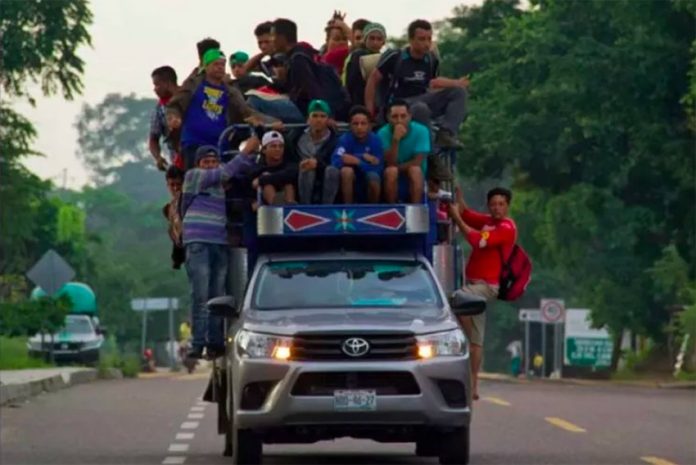Two busloads of Central Americans traveling as part of the first migrant caravan were kidnapped and handed over to a criminal organization, a human rights official claims.
The National Human Rights Commission (CNDH) said today that about 80 migrants are missing.
Oaxaca human rights ombudsman Arturo Peimbert said yesterday that both he and the Mexico office of the United Nations Refugee Agency (UNHCR) had received reports that around 100 migrants disappeared while traveling through the state of Puebla on Saturday.
Peimbert told the news website Huffington Post that the migrants were abducted by the bus drivers and handed over to suspected criminals who presumably belong to the Zetas drug cartel.
He said that neither state nor federal authorities have responded to reports of the incident.
Criminal groups have long preyed on Central Americans transiting Mexico, forcing men into working for them and pushing women into prostitution. Those who refuse to cooperate run the risk of being killed.
Edgar Corzo, a human rights academic who is serving as a caravan observer for the CNDH, told a press conference this morning that the commission is “taking the corresponding steps” to search for the missing migrants.
Contradicting Peimbert’s earlier claim, Corzo said the migrants had disappeared in Isla, Veracruz, and that the CNDH is “seeking information and questioning people” in that municipality in order to try to establish exactly what happened.
He added that the CNDH had warned migrants and authorities that the route the migrants took through Veracruz “is quite a complicated stretch in terms of security” due to “organized crime risks.”
As the two busloads of migrants remain missing, thousands of their erstwhile travel companions are camping at a sports stadium in the Mexico City borough of Itzacalco.
Borough chief Armando Quintero said today that 7,020 migrants have arrived at the makeshift shelter that is now at “the limit of its capacity.”
Orange markers indicate caravans’ locations on Monday. Sunday’s locations are in yellow and Saturday’s in blue.
He explained that authorities had only expected around 4,000 people, adding that there are worried about how they will cope with the arrival of even more migrants who are still traveling through southern Mexico.
“We have no other option than to deal with the situation but we are worried because contingents continue to arrive,” Quintero said.
He added that medical personnel are attending to the migrants and that hygiene precautions are being taken to avoid the spreading of illness.
Mexico City Mayor José Ramón Amieva said that more migrants are expected to arrive today and tomorrow. He added that the stadium has a capacity for 5,500 people.
According to the Mexico City Human Rights Commission, there are 4,000 people currently at the shelter, meaning that it is only 72% full, contradicting Quintero’s claim.
The second caravan of migrants, made up of around 1,500 people, is resting today in Tapanatepec, Oaxaca, while yet more migrants are even farther away from the capital and the United States border.
As the thousands of Honduran, Salvadoran and Guatemalan migrants have traveled through southern Mexico over the past two weeks — walking long distances and hitching rides when possible — they have depended on municipal authorities for food and shelter.
Mexicans in large numbers have also handed out food and water to the migrants and offered transportation.
However, a poll conducted by the research firm Consulta Mitofsky shows that opinion is divided over whether migrants should be offered assistance as they travel through the country towards the United States border.
Asked whether Mexico should protect migrants and provide humanitarian aid or conversely not offer help and pressure them to return to their countries of origin, 51.4% of 1,000 survey respondents supported the former proposal.
Almost 34% of those polled said that migrants shouldn’t receive any government assistance while just under 15% didn’t respond or said they didn’t know.
Women, people living in rural areas and those of lower socio-economic status said that migrants should be helped and protected in greater numbers than men, people living in urban areas and wealthier respondents, the poll showed.
At least 160 migrants have been deported by Mexican authorities while an even greater number has voluntarily sought assistance to return home.
Some migrants are expected to remain in Mexico to seek work but most remain determined to reach the United States border to seek asylum despite warnings from U.S. President Trump that they won’t be made welcome.
Source: EFE (sp), Huffington Post (sp), Milenio (sp) El Economista (sp)
